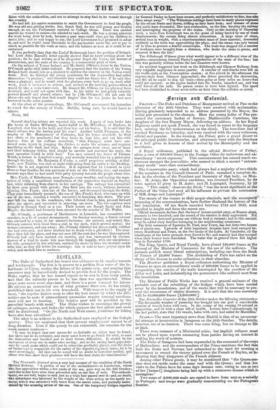SCOTLAND.
'The Duke-of Sutherland has issued two addresses to his smaller tenants acid workpeople. The first is in answer to a petition from some of the in- 'habitants of Clyne, stating the failure of the potato crop, and praying that measures may be immediately devised to provide food for the people. The Duke replies, that he has caused reports to be sent in from every parish, mid, that the calamity proves to be less -than was apprehended. Other crops-were never more abundant, and there is a great demand for labour. He advises an economical use of what potatoes there are: he has totally prohibited their use in his own household. With respect to the supply of meat, " the regular dealers seem to offer the best means by which the drffi- culties canoe met; if extraordinary necessities require unusual exertions, surshavill not be wanting. The helpless poor will be provided by the ,parochial boards with meal." The Duke wishes to encourage the growth 'of cabbages, onions, and leeks; for which purpose the best plants and seeds mill be. distributed. " On the North.and West coasts, premiums for fishing bavealso been advertised."
The other is an address to the Sutherland men employed at the Golepie quarry. They are cautioned that their present employment cannot be of dongsluratien. Even if the quarry be not exhausted, the occasion for the eworknanuot continue- " Itmay be hoped that new means for so desirable an object may be found; -but there can be no certainty,.and.many must have to go South for work, to earn ,for themselves and families mid to meet future difficulties. It should be the ,endeavour of every one to make-some saving; and as the saving bank pays late- west for small sums which could teethe otherwise profitably placed, and the Duke sof-Sutherland is responsible for the safety of the deposits regularly made, let it be eased accordingly. All that can be .saved will no doubt be hereafter needed; and &time who thus Mow their prudence will have the best claim for consideration."
'TheWeireast/e Journal gives a very bad account of the condition of the North filritislr Railway. " A portion of one of the embankments at Lamberton, where 'the line approaches within a few yards of the sea, gave way on the 23d October; -and thctrains have since thened only on one line of rails. The embank-
.ment, we are told, began to sinkproceeded
as a train had passed over it: and, no doubt, 'the subsidence was hastened by the weight of the train acting on the sandy ma- 'tem.!, which was saturated with water from the recent rains, and partially under mined by the scouring action of the sea. One of the temporary bridges exported by General Pasley to have been secure, and perfectly satisfactory to him, has aim been swept away." " The Whinstone cuttings have been in many places ruptured by the recent frosts and thaws, trifling as they have -been; and masses of stone and earth have descended, like vast.avalanches, on the line, burying the railway
and interrupting thepr of the trains. Only orthe morning of Thursdayo week, a train from Edinburgh was on the point of being buried by one of these displacements; the escape being almost miraculous. A _large mass of stone, several tons in weight, with a superincumbent mass of loose material, descended suddenly as the train was approaching the place, and the steam was only turned off in time to prevent a fearful catastrophe. The train;was stopped till a number of workmen were brought from a distance, who broke the stone to pieces, and removed it from the line."
The Edinburgh Witness gives what would appear to be a different view of the matter,—announcing General Pasley's approbation of the state of the line; but this was probably written before the last-disasters-were known.
An accident happened last week on the Edinburgh and Ghoigow Railway, from very culpable negligence in some quarter. A number of coal-trucks were left on the traffic-rails at the Coratorphine station; at five o'clock in the afternoon the express-train from Glasgow approached; the driver_perceived the obstruction, and did all he could to stop his train—then going at forty miles en hour—but could not succeed: so the engine dashed into the trucks, smashed one, and was tself forced off the rails. No person seems to have been injured. Thleresteed had been diminished to about seven miles an hour when the collision cern


























 Previous page
Previous page